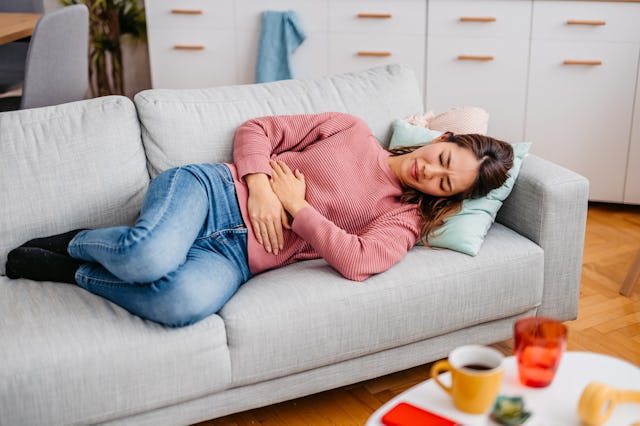PSA: Home Remedies Like Drinking Lemon Juice Won't Actually Make Your Period End Faster
But you aren’t totally devoid of options, says a health practitioner.

It's T-minus 24 hours until vacation, and Flo is still very much enjoying her monthly residence. So much for the cute white sundress that you splurged on and all the crazy hot hotel sex you've been daydreaming about (FYI, you still can have sex on your period, so don't let that stand in the way of kid-free weekend fun). Now you have to somehow find the extra luggage space to pack tampons, pads, and backup underwear. Ughhh. Do you ever just wonder how to make your period end faster? Like, how ideal would it be if you could magically (and naturally) shorten your period whenever you wanted?
Hormonal contraceptive methods are one way to shorten your period. But, depending on your medical history and other important factors (like if you're trying to get pregnant), they aren't always the most viable option. Unfortunately, there aren't a lot of natural remedies that'll end your period faster — at least any that are medically or scientifically backed.
Despite what the internet might tell you (and it can be pretty convincing sometimes), drinking absurd amounts of lemon juice or apple cider vinegar concoctions will not make your period end faster. You're better off saving your mixologist skills for happy hour.
"While it is safe to shorten your period before it begins, there's no scientifically proven way to do so without using hormonal birth control, and even with hormonal birth control, it's only safe to stop your period before you begin menstruation," Jess Bara, a family nurse practitioner, FNP-C, tells Scary Mommy.
Apart from annoying cramps and upcoming beach parties, there are other reasons people might want to shorten their period. Some menstruating people experience medical issues such as heavy bleeding, uterine fibrosis, anemia, endometriosis, and severe migraines during their periods. It’s important to speak with a gynecologist first if you have a heavy flow.
There are a lot of misconceptions around this topic, along with home remedy myths, you should be wary of. Keep reading to learn which of these is unsafe. Plus, which one Bara says may actually help shorten your period.
Can exercise and dieting shorten your period?
Overexercising or limiting food intake may lead to shortening your period duration, but it's not safe and not medically recommended by the Cleveland Clinic. If escalated, these methods can be extremely dangerous to your overall health and lead to more serious conditions down the road. Therefore, the medical community doesn't recommend overstimulating yourself with exercise and restrictive eating.
However, Bara notes that a consistent amount of physical activity that doesn't involve overexerting yourself can help decrease the cramps associated with menstruation. It probably won't lessen your flow, but not crunching over in pain sounds like an OK consolation prize, right? If period cramps keep you up at night, try different positions for relief.
Will taking a NSAID help?
Exercise and dieting won't stop Mother Nature from doing its thing, but there is one natural and safe way to lighten the flow of your period. "According to USC Fertility, taking an NSAID like Ibuprofen can reduce menstrual bleeding as much as 20 to 40%," Bara says.
"These drugs work by reducing your body's production of inflammatory elements called prostaglandins," per USC Fertility's website. "Prostaglandins have important actions on the blood vessels in the inner lining of the uterus, thereby affecting the amount of bleeding that occurs during a menstrual period."
Be sure to familiarize yourself with the drug's labeled instructions so that you know how often and how many NSAIDs you can safely consume. It might be beneficial to keep a time log as well.
What home remedies should you be wary of?
A simple internet search will prove there is no shortage of self-professed remedies for making your period end faster naturally — but that doesn't mean they actually work. You may notice a relief in PMS symptoms like abdominal cramping, but a decrease in blood flow? Not likely. While there are myths that remedies like drinking lemon juice or drinking salt water are all ways to shorten menstruation or lessen your flow, these aren't scientifically-proven facts, Bara reiterates. In addition to the home remedies stated above, here are misconceptions to be wary of:
- Drinking pineapple juice
- Drinking raspberry leaf tea
- Drinking apple cider vinegar
- Consuming gram lentils
- Consuming gelatin
What is the safest way to shorten your period?
If you're still interested in hearing about ways to shorten your period safely and are open to learning about hormonal contraceptive methods, Bara suggests reaching out to your doctor. "The only healthy and safe way to shorten the length of menstruation is before it begins and using hormonal contraceptive methods," she says.
"Hormonal birth control pills won't only help prevent or delay your period, but lighten it, too," Bara continues. "If it's safe for you to use hormonal contraceptives, there are pills that give the option of a two-day period, four-day period, seven-day period, or having it every three months."
If you're considering using birth control and want to change the duration or intensity of your period, Bara recommends consulting a licensed health practitioner or a digital health provider like Favor, who can provide insights on how to effectively and safely delay or lighten menstruation.
Bara adds that long-term reversible contraception, like the Mirena IUD or Nexplanon, can also result in a lighter period. In other words, you have tons of options should you choose this path. At the very least, you can always schedule a consultation with a healthcare provider who can offer more insight and literature before making any decisions.
Expert Source:
Jess Bara, a family nurse practitioner, FNP-C
This article was originally published on